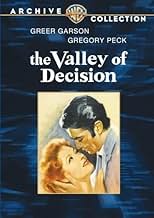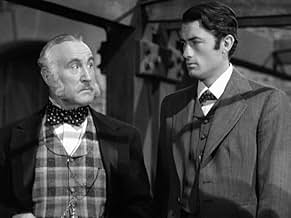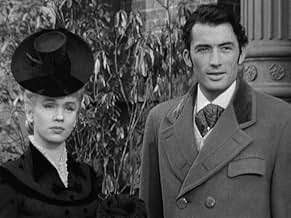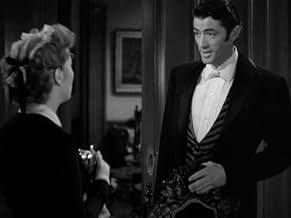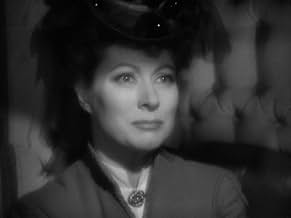IMDb RATING
7.3/10
2.5K
YOUR RATING
An Irish maid falls for the son of her wealthy boss, though their disapproving fathers and a bitter strike at the steel mill complicate matters.An Irish maid falls for the son of her wealthy boss, though their disapproving fathers and a bitter strike at the steel mill complicate matters.An Irish maid falls for the son of her wealthy boss, though their disapproving fathers and a bitter strike at the steel mill complicate matters.
- Director
- Writers
- Stars
- Nominated for 2 Oscars
- 4 wins & 2 nominations total
- Director
- Writers
- All cast & crew
- Production, box office & more at IMDbPro
Featured reviews
In Pittsburgh in 1873, plucky Irish immigrant Greer Garson accepts a position as a servant in the mansion of steel magnate Donald Crisp, though her father was crippled in his mill. Inevitably, Greer and Gregory Peck (as the principled second son of the family) find themselves drawn to each other despite class differences, and surprisingly, his parents spprove. But a series of dramatic events -- a steelworkers' strike, three violent killings, a spite marriage, a natural death and a surprising bequest -- all conspire to keep Greer and Greg apart while the audience is left to wonder when and how they can get together.
In a way we don't care since these mismatched stars have no chemistry together. In only his third screen role, Gregory Peck is always competent and is sometimes better than that, but his cool, placid demeanor works against this tale of romance thwarted for over a decade. For her part, Greer Garson was never one to suggest sexual attraction or romantic passion, and she has the further handicap of looking much older than Peck and seeming too old to play her character in the early parts of the film. But by the end, when her character's age has caught up to her, Garson's usual poise and authority seem just right.
If the lack of fireworks between the stars seems like a drawback, it somehow isn't because the narrative is really about the love affair an unhappy woman has with a warm, charismatic family. And here, the producer and the director Tay Garnett make sure the film is enlivened with a talented and varied supporting cast including Donald Crisp, Gladys Cooper, Lionel Barrymore (a hambone as usual), Dan Duryea, Preston Foster, Reginald Owen, Marshall Thompson and young Dean Stockwell.
Of particular interest are two excellent supporting performances. MGM stalwart Marsha Hunt brings some bite and complexity to the role of Peck's sister, a selfish, superficial woman who is nevertheless decent and loving. And though Jessica Tandy spends most of the film in a thankless role as a brittle society girl hoping to snag Peck, by the end of the film she is allowed to give a vivid performance of bravura shrewishness, the kind of thing Agnes Moorehead usually did so well.
In a way we don't care since these mismatched stars have no chemistry together. In only his third screen role, Gregory Peck is always competent and is sometimes better than that, but his cool, placid demeanor works against this tale of romance thwarted for over a decade. For her part, Greer Garson was never one to suggest sexual attraction or romantic passion, and she has the further handicap of looking much older than Peck and seeming too old to play her character in the early parts of the film. But by the end, when her character's age has caught up to her, Garson's usual poise and authority seem just right.
If the lack of fireworks between the stars seems like a drawback, it somehow isn't because the narrative is really about the love affair an unhappy woman has with a warm, charismatic family. And here, the producer and the director Tay Garnett make sure the film is enlivened with a talented and varied supporting cast including Donald Crisp, Gladys Cooper, Lionel Barrymore (a hambone as usual), Dan Duryea, Preston Foster, Reginald Owen, Marshall Thompson and young Dean Stockwell.
Of particular interest are two excellent supporting performances. MGM stalwart Marsha Hunt brings some bite and complexity to the role of Peck's sister, a selfish, superficial woman who is nevertheless decent and loving. And though Jessica Tandy spends most of the film in a thankless role as a brittle society girl hoping to snag Peck, by the end of the film she is allowed to give a vivid performance of bravura shrewishness, the kind of thing Agnes Moorehead usually did so well.
I viewed this movie and fell in love with the story of a family who owned a Pittsburg Steel Mill. What a great movie where determination and love of the steel mills helped preserve and shape the USA into a world power. The portrayal of steel workers along side the upper class was particularly interesting, because the owners are showed as observers and not really part of the sweat and steel, until Gregory Peck gives an awe inspiring speech about what its like working on the ground floor of a steel mill. I particularly enjoyed Gregory and Greer's on screen relationship and the difficulty of romantic relationships between two different classes. I thoroughly enjoyed this movie.
Very interesting and entertaining poor-girl meets rich-boy tale of romance between a wealthy Pittsburgh steel mill owner(Gregory Peck) and a beautiful housemaid(Greer Garson). This circa 1870 drama is directed by Tay Garnett and based on a Marcia Davenport novel. A star studded cast makes this a prominent classic. Joining Peck and Garson are Donald Crisp, Lionel Barrymore, Dan Duryea, Marsha Hunt, Marshall Thompson, Preston Foster, Jessica Tandy and Reginald Owen. This movie is deserving of your time. Wholesome and enjoyable watching.
Greer Garson, with a terrific Irish brogue, earned still another Oscar nomination. With the exception of 1940, Miss Garson was nominated for best actress from 1939-1945, a Hollywood record.
The film depicts the old problem of wealth vs. poverty. A pretty and pert Greer goes to work for the family of Gregory Peck. They are lovely, unpretentious people. Her dad, played by the irascible Lionel Barrymore, is a hot head if ever there were. His hot-headedness will ultimately lead to his downfall as the film goes on.
We see wealth and snobbery associated with it, especially by Peck's wife, brilliantly played by a young Jessica Tandy. In a change of pace, veteran movie mother, Gladys Cooper, comes off as a wonderfully, kind sort of matriarch married to the indomitable Donald Crisp.
The ending is great. All I can say is that fairness triumphs over snobbery. Class distinctions just seem to go away.
The film depicts the old problem of wealth vs. poverty. A pretty and pert Greer goes to work for the family of Gregory Peck. They are lovely, unpretentious people. Her dad, played by the irascible Lionel Barrymore, is a hot head if ever there were. His hot-headedness will ultimately lead to his downfall as the film goes on.
We see wealth and snobbery associated with it, especially by Peck's wife, brilliantly played by a young Jessica Tandy. In a change of pace, veteran movie mother, Gladys Cooper, comes off as a wonderfully, kind sort of matriarch married to the indomitable Donald Crisp.
The ending is great. All I can say is that fairness triumphs over snobbery. Class distinctions just seem to go away.
This MGM 1945 drama brought Greer Garson and Gregory Peck together for the first and only time. They make a terrific acting pair, at the peak of their careers, and ignite the screen with passionate intensity. Filmed in black and white it tells the story of the dispute between a steel manufacturer and the men that work in the mill. Miss Garson plays a pretty maid who takes a job in the lavish home of Pittsburgh steel magnate, wonderfully played by veteran actor Donald Crisp. Peck plays one of his sons, devoted to his father's mill who works diligently alongside some of the mill workers, notably Preston Foster, to bring a newer more modern way of producing better steel. Crisp has two other sons; Dan Duryea, a bit more greedy for the money rather than the work and Marshall Thompson as the youngest son, who tends to drink away his carefree lifestyle. There is also a daughter played by the talented Marsha Hunt in one of her best performances and certainly worthy of a supporting Oscar nomination. By the way Greer did get a Best Actress nomination for this.
The distinguished Gladys Cooper plays the matriarch of the family and befriends Greer, leaving her share of the mill. Trouble brews among Greer's family when her father, played by another veteran, Lionel Barrymore, an embittered man having lost the use of his legs in an accident in the mill, stirs up violence that has tragic consequences.
Jessica Tandy also gives a dynamic performance as Peck's wife and look for a very young Dean Stockwell as their son. If you like big stars and excellent featured actors along with a compelling story, this is a film for you. Directed by Tay Garnett.
The distinguished Gladys Cooper plays the matriarch of the family and befriends Greer, leaving her share of the mill. Trouble brews among Greer's family when her father, played by another veteran, Lionel Barrymore, an embittered man having lost the use of his legs in an accident in the mill, stirs up violence that has tragic consequences.
Jessica Tandy also gives a dynamic performance as Peck's wife and look for a very young Dean Stockwell as their son. If you like big stars and excellent featured actors along with a compelling story, this is a film for you. Directed by Tay Garnett.
Did you know
- TriviaFeature film debut of Dean Stockwell.
- GoofsWhen Mary is leaving for Europe after stopping at her father's house, she rushes away without her satchel containing all her belongings. She boards the carriage without it, and Jim, who accompanies her outside, is not carrying it either.
People sometimes do forget to take their bags when leaving for a trip. Also, as Constance wanted Mary to come with her, and she and her husband are quite wealthy, they would simply buy Mary a contemporary continental wardrobe.
- Quotes
Paul Scott: [Mary is upset over her father's stubbornness and begins crying. Paul leads her to a bluff overlooking Pittsburgh's steel mills] You can see all of Pittsburgh from here, but Pittsburgh can't see you. Why don't you sit down and cry it out?
- ConnectionsReferenced in Romance sans lendemain (1954)
- SoundtracksMolly Baun
(uncredited)
Traditional Irish Ballad
Sung a cappella by Greer Garson
Also played a bit in the score
- How long is The Valley of Decision?Powered by Alexa
Details
- Release date
- Country of origin
- Language
- Also known as
- The Valley of Decision
- Filming locations
- Production company
- See more company credits at IMDbPro
Box office
- Budget
- $2,160,000 (estimated)
- Runtime1 hour 59 minutes
- Color
- Aspect ratio
- 1.33 : 1
Contribute to this page
Suggest an edit or add missing content



